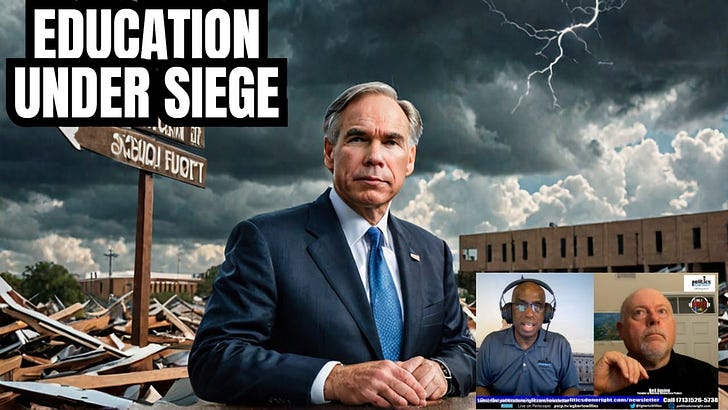Charter Schools are frauds. The actions of a former administrator at a public school prove it.
Charter Schools are among the biggest frauds in education. After his Houston Independent District coup, TX Gov. Abbott installed Mike Miles, a former failed Charter School administrator.
Charter Schools are frauds.
Charter schools have emerged as a controversial alternative to traditional public schooling. Proponents argue that they offer choice and innovation, while critics, including many progressive voices, see them as vehicles for privatization and inequity. The case of Mike Miles, a former public school administrator who became a charter school operator, exemplifies the failures and fraudulence often associated with charter schools.
Mike Miles, once a Dallas Independent School District superintendent, later established three charter schools in Colorado. All three schools failed spectacularly. This failure is not an anomaly but a reflection of systemic issues inherent in the charter school model. Charter schools siphon public funds while offering no substantial improvement over traditional public schools. They promise choice and quality but often deliver neither, particularly in marginalized communities.
The core problem with charter schools lies in their funding model. Public schools receive a set amount of money per student from taxpayers. This funding is supposed to ensure equitable education opportunities for all students, regardless of their socioeconomic background. However, charter schools divert these public funds into private hands. This diversion creates a parallel system where public dollars fund privately managed schools, which often lack the transparency and accountability of public institutions.
Charter schools frequently claim to be nonprofit entities, but this distinction is often meaningless. Whether for-profit or nonprofit, charter schools operate under a system designed to generate financial gain for their administrators. In many cases, charter school administrators receive exorbitant salaries, far exceeding those of their public school counterparts. This financial structure raises questions about priorities: are charter schools focused on student achievement, or are they a means for a few to profit at the expense of many?
The notion that charter schools perform better than public schools is not up for debate. While newer studies indicate that their records have improved, their lack of accountability and transparency makes them suspect. All Texas ISD outperformed these Schools on The Texas 2021 STAAR test.
The case of Mike Miles highlights these issues starkly. After his tenure in Dallas, Miles established three charter schools in Colorado, all of which failed. Despite this track record, Texas Governor Greg Abbott appointed him to oversee the Houston Independent School District (HISD). This appointment was part of a broader state takeover of HISD, widely criticized as undemocratic and unnecessary. The decision to place a failed charter school operator in charge of one of the largest public school districts in the country is emblematic of the broader push to undermine public education in favor of privatized alternatives.
Public schools are the backbone of the American education system. They are designed to provide equitable education to all students, regardless of their background. Charter schools, by contrast, often exacerbate existing inequalities. They tend to attract students whose parents are more engaged and have the resources to navigate the application process, leaving traditional public schools with higher concentrations of students needing additional support. This process creates a two-tiered system where those with means can access better resources while others are left behind.
Teachers are another critical aspect of this equation. Public school teachers must meet stringent certification standards and often receive better pay and benefits than their charter school counterparts. This requirement ensures professionalism and competence in the classroom that charter schools, which often hire uncertified teachers, may lack. The devaluation of teachers in charter schools reflects a broader trend of undermining the teaching profession, which is antithetical to the goal of providing high-quality education to all students.
The narrative around charter schools also obscures the real challenges facing public education. Public schools are often underfunded and burdened with addressing various social issues beyond the classroom. Instead of siphoning funds into charter schools, a more equitable and effective approach would be to invest directly in public schools, ensuring they have the resources and support needed to succeed. This investment includes paying teachers a fair wage, providing comprehensive support services for students, and ensuring that schools in all neighborhoods have the resources they need to thrive.
The appointment of Mike Miles to oversee HISD, despite his failed track record with charter schools, underscores the flawed logic driving the charter school movement. The movement is rooted in the idea that public institutions are inherently inefficient and that privatization is the solution. However, the evidence suggests otherwise. These schools do not consistently outperform public schools and often lack the accountability and transparency necessary to ensure quality education.
The case of Mike Miles and the broader issues with charter schools illustrate the dangers of privatizing public education. Charter schools divert public funds, often fail to deliver on their promises, and exacerbate educational inequities. The focus should be on strengthening public schools, investing in teachers, and ensuring all students have access to high-quality education. The progressive vision for education is one where public schools are adequately funded, teachers are respected and well-compensated, and every student has the opportunity to succeed. This vision starkly contrasts the failed promises of the charter school model, as exemplified by the actions of Mike Miles.
Please support our values via Independent Media.
The other side has big donors and everyday citizens who invest heavily in platforms that lie and misinform. All we have is you. So, please invest in our media outlet by clicking the subscribe button below to become a paid subscriber. You won’t miss that coffee, but it will make a difference in our politics as we spread the truth about our policies and progressive politics. All paid subscribers get to read my five books on this platform and all subsequent books I write. They will also be privy to subsequent incentives.






